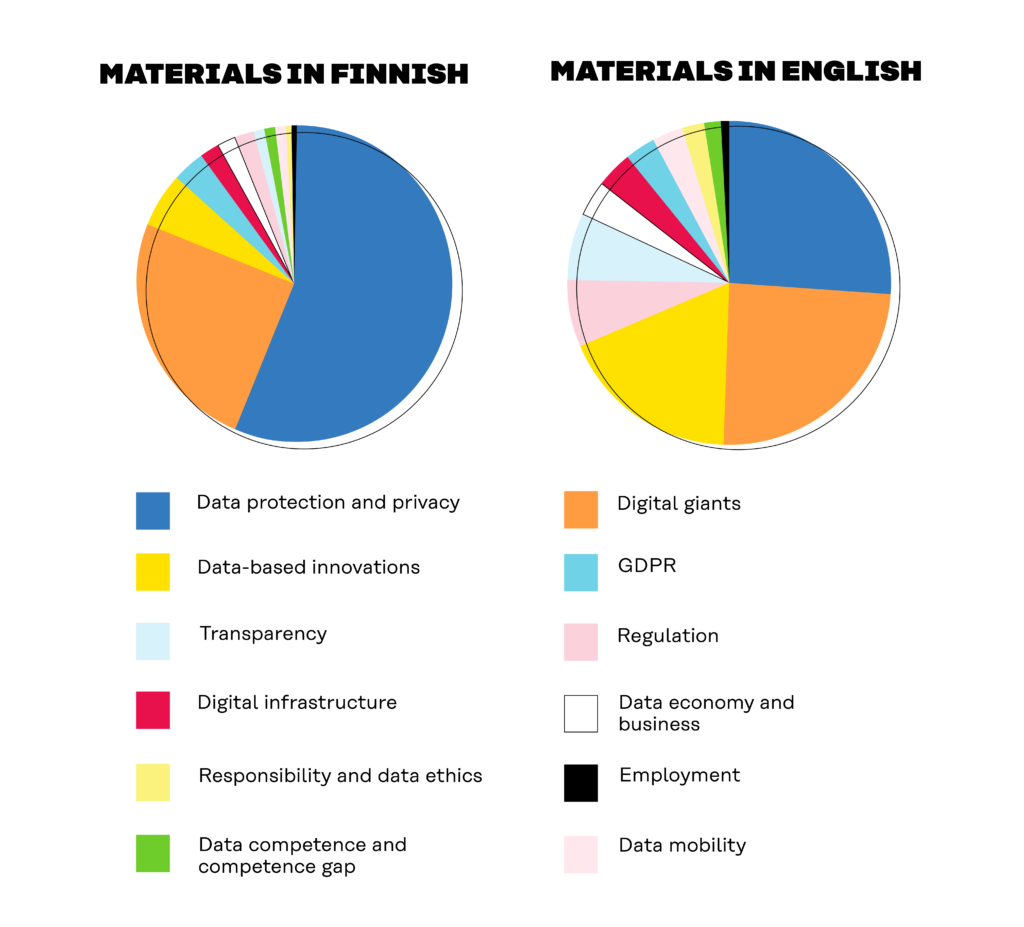The debate on responsible data-driven business and society’s ways of using data is still limited, but the potential of the data economy is already recognised. This is how we could sum up the online media debate on this topic in Finland last year, according to a probe conducted by Sitra and the media analysis company Meedius International.
Data and the information processed from it are crucial for Finland’s economy and competitiveness. The better use and sharing of data can generate prosperity, improve business competitiveness and develop society. The better use of data can also help make societies more resilient to crises.
To do this successfully, there needs to be a broad understanding of the operating logic of a data-driven society, encompassing both opportunities and threats. This is why Sitra wanted to explore the open public debate on the topic: how do we as a society talk about data-driven change? What discourses are emerging and what sorts of opportunities for change do we see before us? And who has a voice in the debate?
Using online media stories and social media discussion for analysis
Analysis of online source material was done to determine the kind of public on the data economy Data economy An area of the economy where the collection and use of data are a key part of activities. Open term page Data economy taking place in Finland and internationally: what topics and perspectives on the data economy issues and points of view are emerging in Finland and in English-language media, and who or what groupings are discussing them.
Another aim was to identify future perspectives associated with data economy issues. The content and tone of these future perspectives can tell us what kinds of future opportunities or threats are perceived in society in the field of data economy.
The analysis of the debate and of data economy topics was conducted for Sitra by the media analysis company Meedius International.
The materials were analysed through selected topic areas. These were:
- digital infrastructure
- data mobility
- data protection and privacy
- data economy and business
- data-based innovations
- data skills and skills gap
- employment
- digital giants
- regulation
- General Data Protection Regulation (GDPR)
- responsibility and data ethics
- transparency.
The study mainly focused on qualitative analysis, the themes that emerged in the source material and how they were addressed. The purpose of the study was not to quantitatively compare the differences between the Finnish-language and English-language material, which would have been difficult given the size of the respective language areas.
Limited range of topics in Finland
In Finland, public debate on the data economy in online and social media proved to be limited both in terms of the range of topics and the participants in the debate.
During the review period, topics discussed in the media included the decision of Facebook’s parent company to change its name to Meta and the company’s development towards becoming a metaverse, Klarna’s and Vastaamo’s data security breaches and Amazon’s and WhatsApp’s GDPR violations. Other featured topics included the selling of Wolt to the US company DoorDash, the Pegasus spying scandal, attempts to phish for online banking credentials and privacy considerations related to Covid-19 vaccinations.
The Finnish debate during the review period focused on data protection and security and cybersecurity issues. This was already a case several months before Russia’s war of aggression against Ukraine, which has raised the debate on cybersecurity.
During the period under review, the themes were often addressed from the angle of individual data security breaches. Analyst Stiina Kivimäki led the analysis work at Meedius International and found the focus on data protection and cybersecurity surprising.
“In the international media debate, data economy topics were more closely linked to other global phenomena. Critical comments regarding the inflated power of digital giants, the use of health data in pandemic management and the debate on the deepening of the digital divide were more prominent,” said Kivimäki. “In this respect, the materials seemed like they were from different periods of time.”

Power of large digital companies was much discussed
One of the main issues was the activities of digital giants and their impact on society. How their activities are regulated in turn drives the development of the digital economy.
Events during the review period included the Facebook revelations by the whistleblower Frances Haugen. In both the Finnish and international debate, digital giants were seen as a threat to people’s privacy and the functioning of democracy.
However, there were differences between the Finnish and the international debate. In the international media debate, more attention was paid to the increasing power of digital giants and the need for and urgency of regulation. Criticism of digital giants was a cross-cutting theme. The accumulation of corporate power was seen in the debate as an unacceptable factor that poses a serious threat to the stability of societies. Criticism focused especially on the lack of transparency in the way companies operate and the algorithms they use.
The Finnish debate during the review period focused on data protection and data security questions and cybersecurity issues.
The comments of researchers and non-governmental organisations highlighted the concern that technology develops faster than regulation and that the situation would therefore require immediate action by legislators. At the international level, debate did not focus so much on whether digital giants should be regulated but on how regulation should be executed so that it would protect individuals.
In Finland, the debate on the position of power held by large technology companies did not express a clear stand on how and why this problematic position could be changed. Although threat scenarios were mentioned in Finland, too, the international materials focused more on the sense of urgency and necessity in finding solutions.
The international sources called for more transparency in the operations of digital giants.
The dominance of digital giants was debated in the Finnish-language media especially in connection with the EU’s regulatory activities but also those of the US. In the EU, several legislative proposals to have been advanced to regulate internet services, such as social media platforms and online search engines. It is expected that new legislation will have a positive impact on the development of Europe’s digital economy and ideally will serve as an example for global developments towards a fairer data economy.
The international sources called for more transparency in the operations of digital giants. These companies have been accused of, among other things, hoarding data collected about users, and the debate repeatedly raised the idea of data minimalism – the appropriate collection and use of personal data.
Yet there was little discussion about responsibility, data ethics or the fair data economy under these keywords, either in Finland or internationally. Even so, these themes were touched upon when talking about data protection, transparency and the actions of digital giants.
Gloomy prospects but also opportunities
While the Finnish and international debate was united by a recognition of the threat that digital giants pose for the functioning of democracy, the English-language material had a considerably gloomy and threat-oriented tone, sometimes even dystopian.
There were also gloomy tones in the Finnish-language debate, especially in discussion about facial recognition technology or the impacts of the metaverse. Nevertheless, the views of the future were not all gloomy, and the debate on new technologies considered both their potential and their threats.
A concern that could be seen in both sets of source material was that Europe is lagging behind the technological developments led by China and the US.
For instance, the metaverse seems to yield benefits for Finnish high-growth companies, but the debate also commented on the potential impacts of virtual reality on the well-being of people and the polarisation of societies.
A concern that could be seen in both sets of source material was that Europe is lagging behind the technological developments led by China and the US. China’s investment in future technologies such as 5G networks and semiconductors was mentioned repeatedly.
At the same time, the Finnish-language sources highlighted how terms and conditions must be set for the development of digital infrastructure. For example, the Finnish Security and Intelligence Service warned that data infrastructure is of interest to foreign economic powers, especially China. The close links between Chinese companies and the Chinese state leadership were also mentioned in the debate.
Is there an emerging debate on the potential of a data-driven society and economy?
The bigger picture of the development of a data-driven society and economy did not really feature in the Finnish debate. There was less attention given to the links with other developments in the global economy and ongoing changes in society. In the English-language material, these connections were more prominently discussed during the review period.
On the basis of the review, it does not seem that the data economy Data economy An area of the economy where the collection and use of data are a key part of activities. Open term page Data economy as a concept is widely used in Finland. Instead, there may be talk about the use of data and the development and renewal of companies’ business operations using data and digitalisation. It is possible that Finland is only now starting to grasp the potential of the data economy.
Other themes that emerged from the source material were the preservation of the welfare state through the development of data and digital technologies and the perspective of national competitiveness. From this angle, the data economy appeared as a significant opportunity for Finland.
Competitive advantage from data – more skills needed
The significance of data and digital technologies for Finland’s national competitiveness is well recognised. The importance of technology for national competitiveness and the opportunities for Finnish companies were highlighted, for example in debate on the metaverse and artificial intelligence.
The significance of digital technologies for preserving the welfare state was raised in the few comments by politicians that could be found in the material analysed.
Nevertheless, more skills are needed for using data in society, and this need came up especially when data analytics and cyber security were discussed. In the international material the emphasis was on developing thinking and work culture, whereas the Finnish sources focused especially on the developing business skills.
In both sets of source material, the image of the EU was that of an international pioneer in data regulation. Regulation was seen as strengthening the competitive advantage of European companies, although there were also some dissenting voices. The Finnish-language debate on regulation mainly concerned the EU level but there was little discussion of the national impact of decisions.
Environmental aspects in a minority
Although major efforts such as the UN Climate Change Conference in Glasgow took place during the period under review there was limited debate on the environmental aspects of digitalisation and the data economy. The digital and green twin transition driven by the European Commission was also largely absent. The twin transition refers to the EU’s efforts to build climate neutrality and digital leadership in industry, in line with the European Green Deal.
Harnessing data and digital technologies to build a more sustainable society received only scant mention.
Setting sights on new opportunities
What are the keys to developing the data economy in Finland based on the debates and thematic analysis?
“As a society, we need a more common understanding of the operating logic of a data-driven society and the perception of its potential in both the public and private sectors. We need more social debate because such dialogue is conspicuously absent, as the study by Meedius shows,” said Laura Halenius, Director of Sitra’s A Roadmap for a Fair Data Economy project.
A memorandum published by Sitra early this year says that Finland is falling behind international developments in which data and information processed from it are renewing the economy and competitiveness. In the future economy, the ability to use data will have a decisive impact on the progress of digitalisation and the green transition. But, at the same time, the rights of people and companies in a digital world need to be agreed.
On the horizon, we may see services that increase welfare but only if we succeed in creating fair rules for the platform and data economy and if there is a broader understanding of how data can be used as raw material for new services.
“There’s a lack of data economy skills in Finland and political decision-makers understand the data economy only partially,” said Halenius. The source material suggests that the debate on the data economy has not necessarily made its way on to the political agenda.
The direction in which the data-driven society will develop depends on entrepreneurs, legislators, researchers, consumers and the public.
“At Sitra we believe that we need more future scenarios that highlight opportunities, concrete examples and success stories. A threat-oriented debate will not make us work for a better future. We are responding to this need with our A Roadmap for a Fair Data Economy project, where we help different stakeholders to see opportunities in the data-based future economy,” said Halenius.
The project is currently working on a study of EU’s data regulation and the impacts of changing regulation on businesses, the public sector and individuals. The report and its recommendations will be published in May 2022.
The studies carried out under the project will build the missing picture of data economy development in Finland and lay the groundwork for the roadmap work that will start soon.


